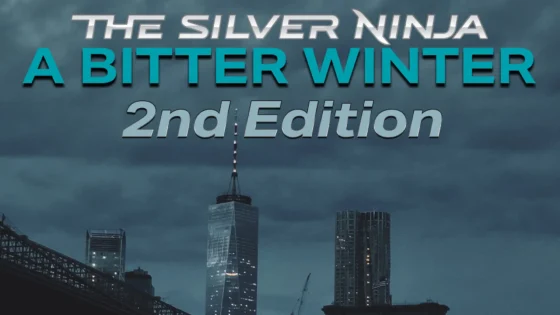This is part 5 of my series called, “Creating Silver.” This blog and its posts will talk about the troubles I went through brainstorming, writing, and publishing The Silver Ninja. I will talk about user reviews, sales, editing, marketing and any other miscellaneous obstacles I encountered along the way. I’m also going to talk about what went wrong.
What went horribly wrong…
You know you’re an author when you login to check your sales data, and notice that someone posted a review of your book. To your dismay, you realize that you’re the benefactor of a brand new 1 star review, and the reader is just ripping your labor of love into shreds. Here you’ve spent who knows how long writing your book; laboring over every word and edit so that it was perfect for distribution; and someone has the nerve to tell you that the book sucks?
Well yeah, it happens, and it is within their right to say so. Sometimes an author can get too close to a project that they don’t realize that their work has problems. Whether it’s numerous typos, plot issues, or even… gasp! Terrible writing. You, as an author, must learn to develop a thick skin. So if you were one of the poor indie authors who got a review bashing, sorry, you won’t find sympathy here. You’re going to have to get over it, no bones about it.
This doesn’t mean take all reviews as gospel. Remember, on the internet, people by default will be demeaning to you and your work. You don’t need to stand for bullying or harassment, so learn to ignore the reviews that say, “This author sucks, this book is (insert derogatory term).” If they don’t offer anything constructive or even manage to stay relevant to your book, don’t bother giving them the time of day. But when you do get a legitimate negative review and feel yourself getting hurt feelings over what was said…
Don’t–show–your emotions–publicly. If you were pissed off after reading a negative review. Take a break! Go do something else, clear your thoughts. Whatever you do, don’t you dare sit down at that keyboard and write a response while angry. You have the freedom to do so, but I assure you it will end horribly. It’s the equivalent of discussing politics and religion on the internet, you’re not going to convince a person to think otherwise or agree to your views. The internet is not the same as in real life, people are less likely to back down even when they are proven wrong. But that’s a different topic altogether. Once people see that your feelings are hurt, they will continue lunging into your gaping wound. Not everyone mind you, in fact, there’s only a small percentage of jerks that will actively harass you. But know this, the second you attack a reviewer, you have already lost the battle.
The anonymity of the internet gives people a boost of courage that you would rarely witness in real life. Don’t expect sympathy from readers, expect them to misunderstand what you said and fight back. However, it is entirely possible to respond to a review without starting a war. Remember, now that you are a published author, you need to present yourself in an appropriate and professional manner. If you want to be known as a friendly author or a funny author, how you respond to people will color their view of you.
As someone who has received the 1 and 2 star reviews, this is my advice on how to deal with the feedback:
-
– Don’t take it personally. As long as the reader isn’t attacking you as an author, try to distance yourself from the amount of work you put into the book. Look at it with an outsider’s perspective and detach all emotion from reading the review.
-
– Take pleasure in the review. Remember, the reader took the time out of his or her day to tell you why the book didn’t work for them. Look at it as an opportunity to learn from your mistakes and filter out what information you can and cannot address. CAN address typos. CANNOT address how you envisioned the main character.
-
– Don’t reply when you’re angry, it will turn into a battle that has no ending. Do you really want to be proud of winning a battle on the internet? Really, think about that.
-
– Read the negative reviews very carefully and try to filter out the message within. Some readers are more aggressive than others and you may need to do a bit of skimming to identify exactly what problem the reader had with the book. For my novel, The Silver Ninja, a lot of the negative reviews complained that there were too many plot holes and that the writing was stilted and needed refining. These were all valid points, but I made sure not to get offended by what they said.
-
– If you’re going to reply to any of these negative reviews (which is not recommended), make your response as positive as possible. It’s very easy for readers to assume the author is going to go on the defensive. Therefore, keep your answers positive, short, and don’t put any blame on the reader for not understanding. Tell the reader that you recognize the issues, you thank them for their feedback, and mention how you’re going to address those issues in your next book. That’s it, don’t say anything else.
-
– If you’re getting consistent 1-2 star reviews across the board, as in they are in the majority and not the minority. I’m sorry but your book either sucks or is broken. You really need to figure out why people are rating it so low and address the problems (and when I say broken, I mean the table of contents doesn’t work or the text is not showing up properly). Just remember, it doesn’t mean -you- suck, always remember that.
-
– If you are incapable of replying in a diplomatic way and cannot distance yourself from your work. Then don’t reply, it’s OK. It’s an accepted practice to not respond to reviews. I choose to do so because I want the reader to know that I value their feedback.
Obviously this advice is subjective. After all, if you wrote a book about an empowered super woman back in the 1800’s or earlier, well you can imagine how that would be received. But let’s be real, a majority of us aren’t writing Shakespeare. Sometimes, we’re going to write about things that only interest a very small percentage of people, and that’s OK. Just don’t get hurt feelings when the mainstream thinks your book is too weird, too corny, or simply not to their tastes. That’s what they call, “a niche.”
The point is, the age old adage is true. “You can’t please everybody.” Nor should you attempt to please everybody. However, at the same time, be cognizant that sometimes you, the author, are wrong. Sometimes you do have a lot of typos, your wording is too descriptive, and you’ve overused similes. Recognize the things you didn’t mean to do intentionally and fix them. That way, when you write your second book, you can really wow the audience with how far you’ve improved.
My next post was going to talk about book sequels, but ever since I started reading Techniques for the Selling Writer I think it’s important to discuss… reflections.
Tune in next week as I share my feelings and thoughts on The Silver Ninja and how I feel about it, months after having released it.




